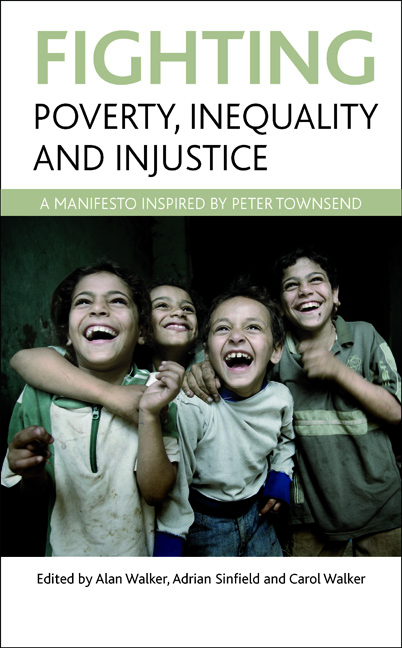Book contents
- Frontmatter
- Dedication
- Contents
- List of figures and tables
- Preface
- Notes on contributors
- one The legacy of Peter Townsend
- two The making of a pioneer researcher: reflections from Peter Townsend’s life story
- three Peter Townsend, a man ahead of his time: re-reading The family life of old people and The last refuge
- four The case for universal child benefit
- five Poverty
- six Social justice for children: investigating and eradicating child poverty
- seven For universalism and against the means test
- eight Underclass, overclass, ruling class, supernova class
- nine Addressing health inequalities: building on Peter Townsend’s legacy
- ten Towards a new sociology of ageing: from structured dependency to critical gerontology
- eleven Disability: prospects for social inclusion
- twelve Putting the lawyers in their place: the role of human rights in the struggle against poverty
- thirteen Radicalising social policy in the 21st century: a global approach
- fourteen Conclusion: building on the legacy of Peter Townsend
- Index
six - Social justice for children: investigating and eradicating child poverty
Published online by Cambridge University Press: 01 September 2022
- Frontmatter
- Dedication
- Contents
- List of figures and tables
- Preface
- Notes on contributors
- one The legacy of Peter Townsend
- two The making of a pioneer researcher: reflections from Peter Townsend’s life story
- three Peter Townsend, a man ahead of his time: re-reading The family life of old people and The last refuge
- four The case for universal child benefit
- five Poverty
- six Social justice for children: investigating and eradicating child poverty
- seven For universalism and against the means test
- eight Underclass, overclass, ruling class, supernova class
- nine Addressing health inequalities: building on Peter Townsend’s legacy
- ten Towards a new sociology of ageing: from structured dependency to critical gerontology
- eleven Disability: prospects for social inclusion
- twelve Putting the lawyers in their place: the role of human rights in the struggle against poverty
- thirteen Radicalising social policy in the 21st century: a global approach
- fourteen Conclusion: building on the legacy of Peter Townsend
- Index
Summary
Peter Townsend was a towering figure in the anti-child poverty cause. It is difficult to exaggerate the impact he had both on the study of child poverty and on the campaign to eradicate it. Yet, surprisingly, the concept of ‘child poverty’ does not figure prominently in his writings about poverty in the UK. Of course, this is not to say that Townsend downplayed the significance of child poverty in the UK. He was, after all, a prominent campaigner against it. Rather, he did not separate it out from the wider issues of poverty and privilege as a discrete problem, which could be solved without addressing the underlying structures of inequality that maintain social injustice. In the Foreword to a history of the Child Poverty Action Group (CPAG), with which he was closely associated, he wrote: ‘More attention must be given to the exposure of excessive and unnecessary privilege, as much as excessive and unnecessary power. It is impossible to raise the poor without simultaneously diminishing the rich’ (1986). This means, therefore, that any assessment of his work on child poverty and its impact cannot be easily divorced from his work on poverty and inequality more generally. The first part of this chapter considers Townsend's contribution both as a social scientist and as a campaigner within this wider context. The second part discusses how we might build on Townsend's legacy with regard to both the investigation into and the eradication of child poverty.
The contribution: social scientist and campaigner extraordinaire
Townsend's contribution to the anti-child poverty cause is particularly notable for his powerful structural analysis of poverty, his conceptualisation of poverty as relative, his contribution to the ‘rediscovery’ of child poverty and his role as an engaged academic who also campaigned against child poverty.
A structural analysis
Underlying Townsend's contribution as a social scientist and campaigner was a clear structural analysis of poverty and its causes. This was firmly articulated in Poverty in the United Kingdom:
The theoretical approach developed in this book is one rooted in class relations. Some account has to be given to allocative principles and mechanisms and developments in the pattern of social life and consumption.
- Type
- Chapter
- Information
- Fighting Poverty, Inequality and InjusticeA Manifesto Inspired by Peter Townsend, pp. 111 - 132Publisher: Bristol University PressPrint publication year: 2011



